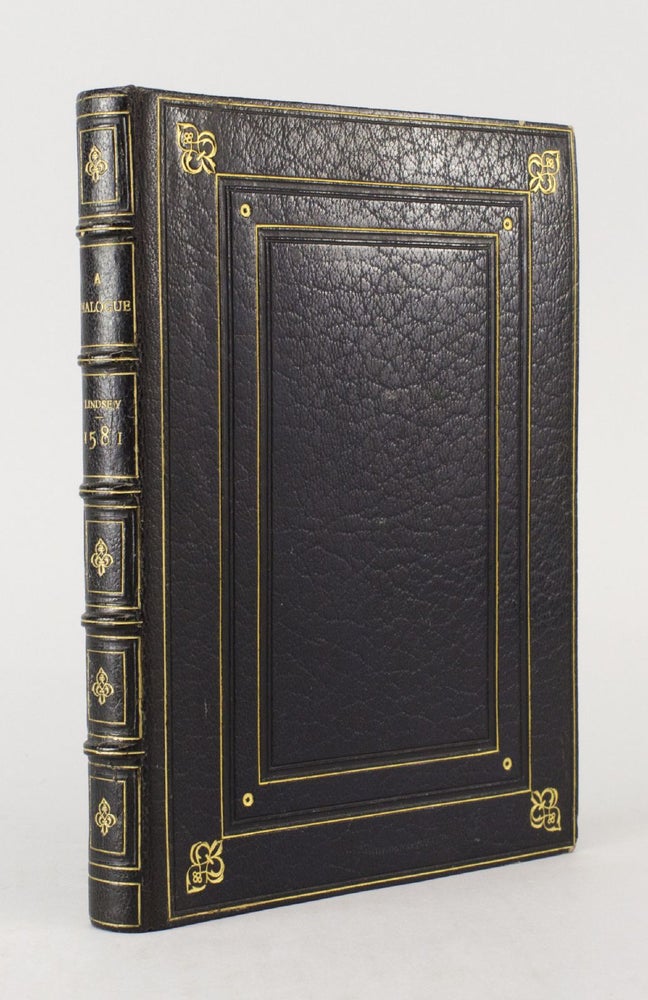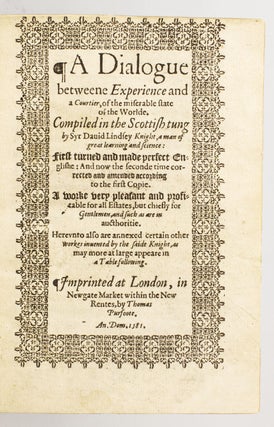A DIALOGUE BETWEENE EXPERIENCE AND A COURTIER, OF THE MISERABLE STATE OF THE WORLDE.
(London: Thomas Purfoote, 1581). 188 x 144 mm. (7 1/2 x 5 5/8"). 4 p.l., 140 (i.e., 148) leaves.
Pleasant 19th century black crushed morocco by Riviere and Son (stamp-signed in gilt on front turn-in), covers with panels framed by blind and gilt rules, gilt trefoil tool and anular dot at each corner, raised bands, spine in gilt-ruled compartments with trefoil centerpiece, gilt titling, gilt-ruled turn-ins, all edges gilt. Title within ornamental border, small decorative woodcut initials. Printed in black letter type. Front pastedown with bookplate of Robert S. Pirie; front free endpaper with armorial bookplate of Sir Richard Newdigate dated 1709; a few pages with ink annotations in a contemporary hand. STC 15678; ESTC S108560. See also: Longman, "Bibliotheca Anglo-poetica," pp. 190-92. ◆Corners slightly rubbed, top margin trimmed a bit close, occasionally touching running title, leaves just a shade less than bright, a few spots of foxing and soiling, otherwise an excellent copy--with few signs of use--of a book expected to be found in poor condition.
Originally published in 1554 and commonly referred to as simply "The Monarche," this didactic poem played an important role in the Protestant Reformation in Scotland. Lindsay here criticizes various doctrines and practices of the Catholic Church, including the concept of purgatory, the popular custom of pilgrimages to venerate saints, and even the papacy itself. Longman (quoting Heron's "History of Scotland") notes that "this poem probably contributed in an eminent manner to inflame that spirit of religious reformation, by which the Papal establishment was within no long time after overthrown." Indeed, in the years and centuries following the author's death, this particular work became the subject of increasing interest and popularity as the reform movement in Scotland picked up serious momentum and created real change, with reforms adopted by Parliament as early as 1560. This publication includes four other poems by Lindsay that echo this same spirit; while none of them matches the length and ambition of "The Monarche," many of them anticipate its strongly reformist overtones by emphasizing the responsibilities (and sometimes the abuses) of both the ruling powers and the clergy. A firm believer in the power of the vernacular, Lindsay originally composed this work in the "Scottish tung," praising the language's "utility in making important matters accessible to the populace as a whole and not just a narrow educated élite." (DNB) Despite his populist leanings, Sir David Lindsay (ca. 1486-1555) remained largely in the favor of the Scottish Court, first under James V and then under the Earl of Arran, regent to the infant Mary I of Scotland. As a writer, Lindsay enjoyed popularity and respect in his own time, but his contributions have been somewhat overlooked by modern historians. Fortunately, as DNB notes, "recent criticism . . . suggests that [he] may again be coming to receive due recognition as a gifted artist as well as one of the most popular and eloquent voices of the Scottish Reformation." Early editions of this work are extremely rare. (ST13044)
Price: $11,000.00


